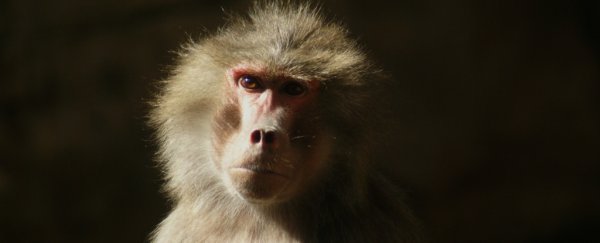A pig's heart has been kept healthy and beating inside a baboon's abdomen for well over two years, setting a new world record, and suggesting that cross-species transplants are closer than ever before.
The baboon still had its original heart, so it wasn't relying on the pig's organ, but the fact that the heart survived inside its abdomen for so long without being destroyed by the monkey's immune system is impressive, and suggests that we could one day transplant animal organs into humans. Right now, 22 people die in the US every single day waiting for an organ transplant.
The practice of transplanting organs from one species into another is known as xenotransplantation, and now that they've been able to extend the organ survival rate beyond the two-year mark, researchers from the US National Institute of Health think it could save "thousands of lives a year".
"People used to think that this was just some wild experiment and it has no implications," lead researcher Muhammad Mohiuddin told Science. "I think now we're all learning that xenotransplantation in humans can actually happen.
In the past, organs have never survived past 500 days inside another species. But in this experiment, five baboons had pig's hearts hooked up to blood vessels in their abdomens, and although the average survival rate for the hearts was 298 days (around 10 months), one of the organs was still beating after an incredible 945 days.
The researchers were able to keep the pigs' hearts 'alive' so long by genetically modifying the organs so that they'd be better suited to survive the baboon's body and would dampen down an antibody response.
They also kept the baboons on a combination of new immune-suppressing drugs to stop their immune systems from attacking the new hearts. It was only when the researchers began to wean the baboons off the drugs at varying points throughout the experiment that the hearts began to fail.
While baboons are similar to us - and so are ideal to see how we'd respond to organs from another species - scientists think using organs from pigs are our best bet for cross-species transplants, seeing as they're biologically similar to us. We also know their DNA incredibly well, which makes it easier for us to genetically modify their organs.
Although the results are incredibly exciting, the researchers stress that there's still a lot of work to be done.
For starters, even if the technique does work in humans, transplant recipients would need to stay on immunosuppressants for the rest of their life (and that's not to mention the ethical concerns of growing pigs just for our own organ needs). And it's still not clear whether the transplanted hearts would be strong enough to actually keep the baboons alive.
The team now hopes to do a full pig-to-baboon heart transplant in the next few years, and recommend further animal studies to figure out the minimum amount of drugs that need to be given in order to protect the donated organ.
But it's still a promising step towards helping the 122,000 people on the US transplant waiting lists at any one time. Other research groups are also looking into ways of keeping donated organs healthy for longer after they've been harvested, growing replacement organs in the lab, and using a new technique to allow people to receive kidneys from any donor.
It's an exciting time, and hopefully at least one of these options will lead to real, life-saving solutions very soon.
The research has been published in Nature Communication.
